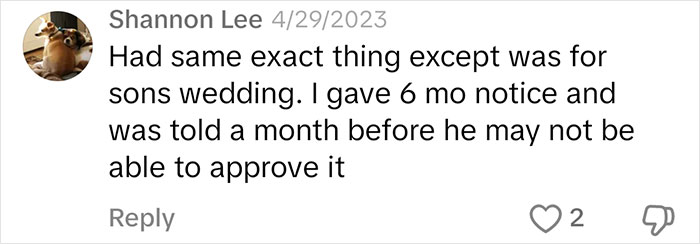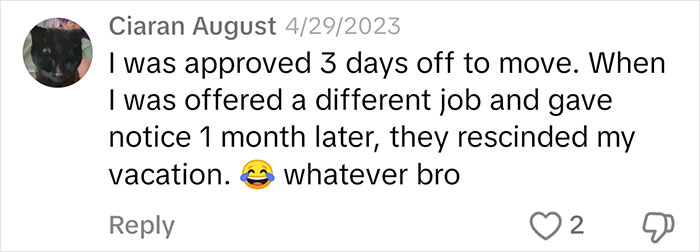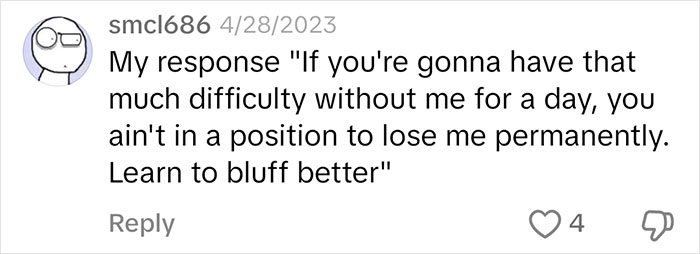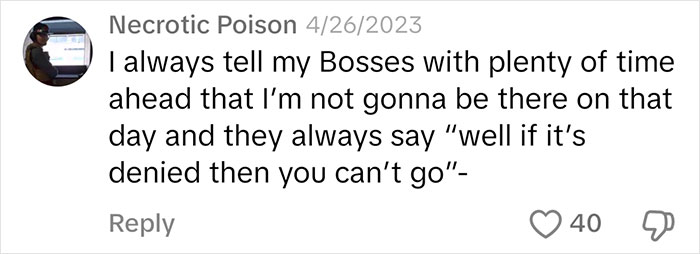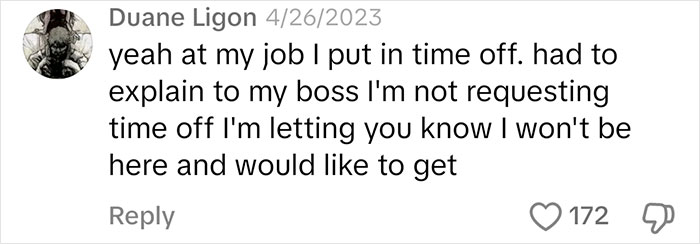Taking days off from work can be a complicated process when you have a small team, limited PTO or a controlling boss. But letting your manager know half a year in advance that you’ll need some time off should be safe, right?
Well, one man recently had to explain to his supervisor how PTO works after she attempted to deny the request he put in months ago. Below, you’ll find the full story that Graeson Mcgaha posted on TikTok, as well as some of the replies invested readers shared.
Taking time off from work is often an unnecessarily complicated process

Image credits: Anna Shvets / pexels (not the actual photo)
So this employee had no patience for his manager who attempted to deny his PTO request
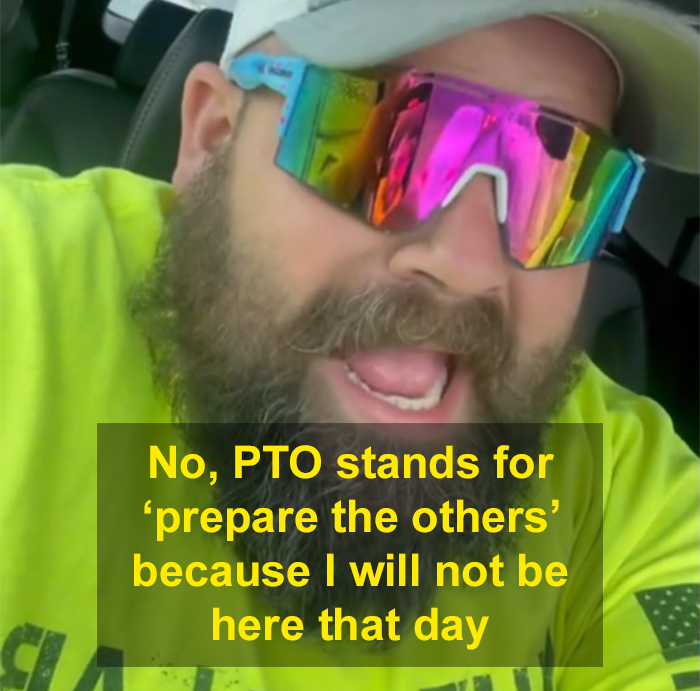
Image credits: graeson.mcgaha.comedy
“I was called into HR today because me and a supervisor had a tiff about a PTO request. See, he thought 6 months ago when I put in the request that I was ASKING to go to my sister’s wedding. No, PTO stands for ‘prepare the others’ because I will not be here that day.”

Image credits: graeson.mcgaha.comedy
“Wait for the best part where she says that it’s a bad economy right now and I’m lucky to have this job. Right, I was hired 5 years ago and out of that new hire orientation class of 20 people, me and about 3 others are the only ones to remain. And I’ve seen the new crop of people that are coming in, the ones that work for 2 days and then no call, no show. Seems to me like I’m not the lucky one in this situation.”

Image credits: graeson.mcgaha.comedy
You can hear Graeson tell the full story here
@graeson.mcgaha.comedy I was called into HR today about my PTO request #workhumor #ptorequest #work #corporate #corporatetiktok ♬ original sound – Graeson Mcgaha Comedy
Taking days off is necessary for our mental and physical health
Whether it’s enjoying a long weekend to rest, relax and binge your favorite show on Netflix or taking two weeks off to visit your family abroad, taking time off from work every now and then is a necessity. Not only do we all deserve to enjoy our lives, as we definitely exist to do more than simply work, taking breaks can be great for your mental and physical health.
According to Everyday Health, getting some rest from work can lower rates of heart disease, reduce stress, lower rates of depression and anxiety, improve productivity when you are in the office, and simply improve overall life satisfaction. Nobody is meant to be spending 40 hours in the office for 52 weeks a year. So don’t be afraid to take that vacation or spend a few days relaxing for your mental health. Your body and mind will thank you.
Unfortunately, however, your boss and colleagues might not thank you for taking time off. In a perfect world, our supervisors would understand that it’s necessary to take breaks, but many don’t seem to see the importance. When it comes to taking paid time off, or PTO, in the United States, the average employee is entitled to 10 days, or two weeks, off a year. If they’ve worked for the same company for at least five years, however, they might be lucky enough to earn 15 days or more annually.

Image credits: Alena Shekhovtcova / pexels (not the actual photo)
Being understaffed can create a host of issues for companies
Indeed explains that there are a variety of types of PTO companies may have, including vacation time, sick days, personal days, bereavement leave, paid holidays, floating holidays, parental leave, jury duty and community service. And to use these days, employees typically have to put in a request ahead of time and wait for it to be approved by their employer. Unless, of course, they suddenly become ill or have an unexpected family emergency.
Factorial HR notes that two weeks in advance is usually enough notice for bosses to have that an employee will be gone, depending on how many days they plan to take off. So six months should have been ample time for Graeson’s employer to prepare for him to attend his sister’s wedding. Not to mention the fact that, if the company is understaffed, that is not his responsibility as an employee.
And apparently, this issue is not uncommon. According to a 2022 survey, Homebase reports that a whopping 78% of businesses self-identify as being understaffed. While it’s understandable for this to happen occasionally, it’s not a position companies want to be in long-term.
Understaffing can put immense stress on employees, lead to a drop in quality of work and productivity, create high turnover rates which only exacerbate the issue, create risks that can lead to injuries and accidents on the job and cause damage to brands.

Image credits: Marc Mueller / pexels (not the actual photo)
Treating employees poorly will always backfire
The issue in this situation could also stem from the fact that Graeson’s boss may be unnecessarily controlling. We have no way of knowing what this manager has been like in the past, but it is well documented that employees are not happy to work for a boss who keeps their team on a tight leash.
A 2022 survey from GoodHire found that less than half of the workers in the United States believe that their managers actually respect their personal time away from work, and 63% report having too many or too few meetings with their bosses.
And when it comes to what behavior really grinds their gears, workers are most annoyed when supervisors micromanage or expect them to work outside of their normal hours. Bosses should be careful about getting on their employees’ bad sides though, as 82% of workers would consider quitting a job where they hated their manager.
We would love to hear your thoughts on Graeson’s video in the comments below, pandas. How would you feel if you found yourself in a similar situation? Then, if you’re interested in reading another Bored Panda piece discussing PTO drama, look no further than right here!

Image credits: Mikhail Nilov / pexels (not the actual photo)
Viewers sympathized with Graeson and echoed the fact that he’s entitled to use his PTO


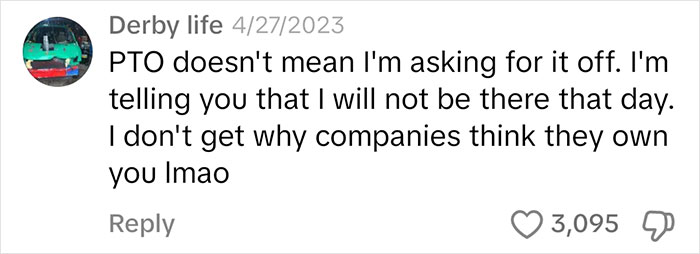



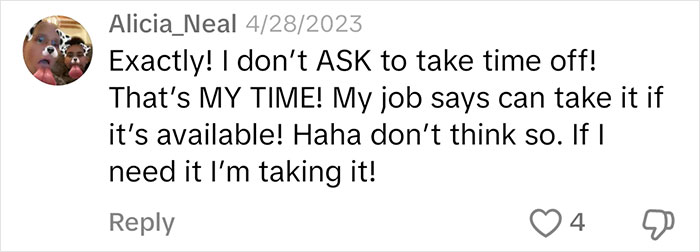

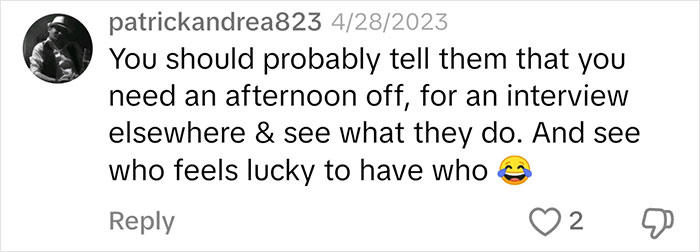




Some even shared similar stories of frustrations they’ve encountered when taking time off

